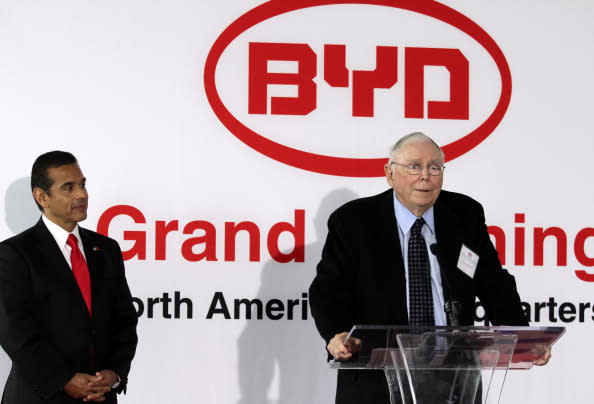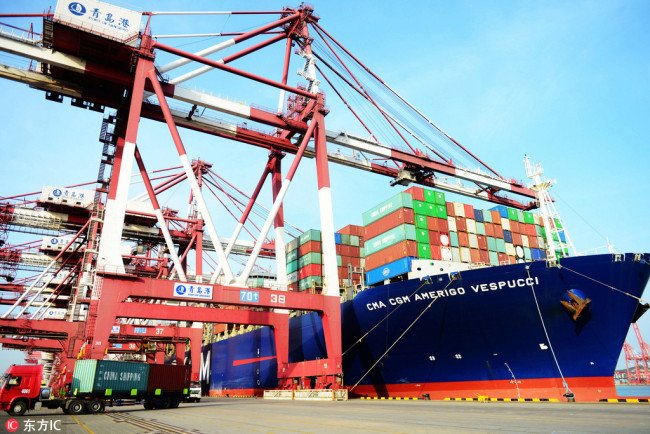Equation
Lieutenant General
This why naysayers can not compare China's growth to Japan or Germany of the 1980s.
Warren Buffett: China has ‘found a secret sauce for themselves’

Warren Buffett, known as the “” in China, speaks highly of the country’s economic growth and is optimistic about its future.
“What they’ve done in the last 50 or 60 years is a total economic miracle. I never would’ve thought it could’ve happened,” Buffett told Yahoo Finance’s Andy Serwer in Omaha earlier this year. “What I do know is they have found a secret sauce for themselves, just like we found the secret sauce a couple centuries ago.” " style="margin-bottom: 1em;">“What they’ve done in the last 50 or 60 years is a total economic miracle. I never would’ve thought it could’ve happened,” Buffett told Yahoo Finance’s Andy Serwer in Omaha earlier this year. “What I do know is they have found a secret sauce for themselves, just like we found the secret sauce a couple centuries ago.”
Buffett says “countries will do it differently,” referring to the fundamental differences between China and the U.S. politically and economically. China’s state capitalism emphasizes economic growth and social stability, with tight control over domestic politics and information. Since the economic reform in 1978, China has grown at a staggering pace of 9.5% per year and has become the world’s second largest economy. In the past five years, China’s GDP growth has slowed down but still achieved an increase of 6.9% last year, dwarfing America’s 2.3% increase. " style="margin-bottom: 1em;">Buffett says “countries will do it differently,” referring to the fundamental differences between China and the U.S. politically and economically. China’s state capitalism emphasizes economic growth and social stability, with tight control over domestic politics and information. Since the economic reform in 1978, China has grown at a staggering pace of 9.5% per year and has become the world’s second largest economy. In the past five years, China’s GDP growth has slowed down but still achieved an increase of 6.9% last year, dwarfing America’s 2.3% increase.
And Buffett believes China’s growth story is far from over. " style="margin-bottom: 1em;">And Buffett believes China’s growth story is far from over.
“They can have growth in the economy from a lower base that will exceed ours percentage wise for a long time,” he said. “They’re destined for a fine economic future, just like we are.”" style="margin-bottom: 1em;">“They can have growth in the economy from a lower base that will exceed ours percentage wise for a long time,” he said. “They’re destined for a fine economic future, just like we are.”
according to the London-based Center for Economics and Business Research. Though, Buffett thinks it will take much longer for China to catch up.
“It’s a long way off.” said Buffett. But he acknowledges the potential since China’s population is almost four times greater than the U.S. “The main thing you have to do is unleash the potential of your people”." style="margin-bottom: 1em;">“It’s a long way off.” said Buffett. But he acknowledges the potential since China’s population is almost four times greater than the U.S. “The main thing you have to do is unleash the potential of your people”.
Investment interest in China" style="font-size: 16px; margin: 0px 0px 1em;">Investment interest in China

Charles Munger, vice chairman of Berkshire Hathaway Inc., speaks at the grand opening of the North American headquarters of Chinese carmaker BYD. (Gerry Images)
Buffett has pocketed some money from China’s economic leap. The only Chinese company Buffett has invested in, via his holding company Berkshire Hathaway, is BYD, a Shenzhen-based battery and electric car maker. The $232 million bet, made in 2008, is now worth about $2.1 billion. " style="margin-bottom: 1em;">Buffett has pocketed some money from China’s economic leap. The only Chinese company Buffett has invested in, via his holding company Berkshire Hathaway, is BYD, a Shenzhen-based battery and electric car maker. The $232 million bet, made in 2008, is now worth about $2.1 billion.
Buffett credits his right-hand man Charlie Munger with that call. Munger is the vice chairman of Berkshire who stands behind the investment and sticks with the company through high and lows. Buffett’s conglomerate hasn’t invested directly in Chinese companies ever since." style="margin-bottom: 1em;">Buffett credits his right-hand man Charlie Munger with that call. Munger is the vice chairman of Berkshire who stands behind the investment and sticks with the company through high and lows. Buffett’s conglomerate hasn’t invested directly in Chinese companies ever since.
“When you got over $100 billion, you’re looking at any big market. We can’t go into tiny markets and really deploy enough capital,” he said. “We want to invest money intelligently. And obviously, big economies and growing economies have the potential.”" style="margin-bottom: 1em;">“When you got over $100 billion, you’re looking at any big market. We can’t go into tiny markets and really deploy enough capital,” he said. “We want to invest money intelligently. And obviously, big economies and growing economies have the potential.”
While trade tensions run high between Beijing and Washington, China’s rise as a superpower is not necessarily a bad thing for the U.S., according to Buffett. “If you postulate two kinds of world’s 50 years from now, and one is where the United States is still doing far better than a good many of the world’s people, or you postulate something where everybody is making a lot of progress, I think you’ve gotta choose the second world,” said Buffett. “We should welcome a more prosperous world, including China.”" style="margin-bottom: 1em;">While trade tensions run high between Beijing and Washington, China’s rise as a superpower is not necessarily a bad thing for the U.S., according to Buffett. “If you postulate two kinds of world’s 50 years from now, and one is where the United States is still doing far better than a good many of the world’s people, or you postulate something where everybody is making a lot of progress, I think you’ve gotta choose the second world,” said Buffett. “We should welcome a more prosperous world, including China.”


